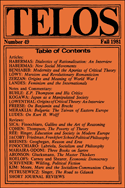What happened in Cologne on New Year’s Eve is taking place now, at this very moment and as a matter of course, in broad daylight a hundred thousand times in North Africa and the Arab world: women are being sexually assaulted, humiliated, and, if they resist the attacks, denounced as “sluts” or “whores.” The Egyptian author and feminist Mona Eltahawy described this phenomenon and its causes on May 2, 2012, in s Slate.fr article: “Well, they [the men of the Arab world] hate us. It has to be finally said. . . . Women in the whole world have problems; it is true that the United States has not yet elected a woman president; and it is true that in many Western countries (I live in one of them), women are still treated like objects. That is the point where the conversation usually ends, if you try to discuss the reasons why Arab societies hate women. Name any Arab country, and I will give you a litany of examples for the bad treatment—it is a thousand times worse than you think—of women, which derives from a poisonous mixture of culture and religion that evidently only very few people are willing to address, out of fear of being accused of blasphemy or shock.”
|
By Samuel Schirmbeck · Tuesday, January 19, 2016 Topics: Arab world, Cologne, fundamentialism, Germany, Islam, islamism, Left, leftism, violence, women By Maja Sidzinska · Tuesday, November 20, 2012 As an occasional feature on TELOSscope, we highlight a past Telos article whose critical insights continue to illuminate our thinking and challenge our assumptions. Today, Maja Sidzinska looks at Joan Landes’s “Feminism and the Internationals” from Telos 49 (Fall 1981). |
Current IssueSubscribe to TelosNow Available!Recent PostsTELOSscope Archives |
|||
|
Telos Press Publishing · PO Box 811 · Candor, NY 13743 · Phone: 212-228-6479 Privacy Policy · Data Protection Copyright © 2025 Telos Press Publishing · All Rights Reserved Our website uses cookies to enhance your experience and show you more relevant content.
For more information, please see our privacy policy. By using our site, you agree to our use of cookies. OK |
||||
 Although 2012 is being hailed as the new Year of the Woman and women’s votes were solicited and cited as pivotal to the outcome of the U.S. presidential election, Joan Landes’s 1981 article “Feminism and the Internationals” provides a timely reminder about the strategic ways that women’s and feminist movements have been deployed in service of political agendas in body politics past. Landes illustrates the historical subordination of women’s and feminist concerns in socialist paradigms and states, shows that the personal was treated as apolitical, and alludes to male epistemic authority as begetting these developments. From the vantage point of Marxist socialism, the problem with feminism is that it undermines the unified class struggle by introducing a competing concern—gender—that threatens the cohesion of the socialist movement.
Although 2012 is being hailed as the new Year of the Woman and women’s votes were solicited and cited as pivotal to the outcome of the U.S. presidential election, Joan Landes’s 1981 article “Feminism and the Internationals” provides a timely reminder about the strategic ways that women’s and feminist movements have been deployed in service of political agendas in body politics past. Landes illustrates the historical subordination of women’s and feminist concerns in socialist paradigms and states, shows that the personal was treated as apolitical, and alludes to male epistemic authority as begetting these developments. From the vantage point of Marxist socialism, the problem with feminism is that it undermines the unified class struggle by introducing a competing concern—gender—that threatens the cohesion of the socialist movement. 

